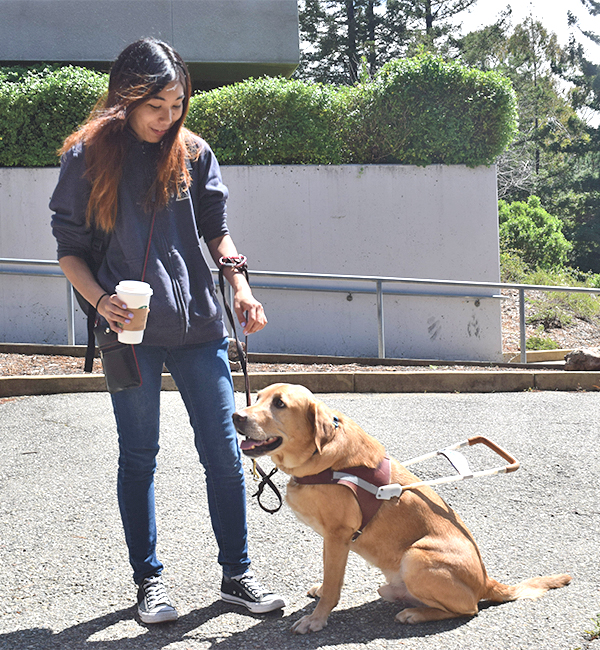Service pets offer guidance, support
Golden retriever Oscar helps psychology major Michelle Yoo as her guide due to Yoo’s partial blindness. Yoo requested a service dog at the Disabled Students’ Programs and Services Office on campus.
Apr 19, 2017
California law guarantees people with disabilities the right to bring trained service dogs and psychiatric service dogs, but not emotional support animals, to any public place and Contra Costa College is no exception to that rule.
CCC Academic Student Services Manager, for Disabled Students Programs and Services (DSPS), Yasuko Abe said, “Each semester is different, but right now we have about two students on campus that use a service dog. As long as I’ve been here there haven’t been any conflicts with service dogs on campus,”
“Once we have a district wide policy set then we will start to give more information to the students about service dogs,” she said.
Californian laws like the Unruh Civil Rights Act, The California Disabled Persons Act, and the Fair Employment and Housing Act, as well as the Federal Americans with Disabilities Act (ADA), protect citizens rights to service dogs and emotional support animals.
Business Management major Alexis Bennett said, “I didn’t even know service dogs were allowed on campus because I don’t see them or see information about them here. I feel there should be more information on campus about them for students — they definitely should be allowed on campus.”
The Galvin Group, an organization that gives guidance to the DSPS program regarding ADA requirements says service animals can be excluded if they are uncontrolled, are not housebroken, are a threat to the health and safety of others or do not meet the college’s standards of conduct. Galvin Group also says the care and supervision of the animal is the owner’s responsibility.
All of the three Colleges in the Contra Costa County Community College District welcome students with service dogs, despite the occasional incident.
The Disabled Student Services Manager at Diablo Valley College, David Hagerty, said, “We have had a complaint about a service dog eating someone’s sandwich off their desk. We have also had complaints from disabled students with service dogs about being asked inappropriate questions about their disability and dog. People are only allowed to ask two questions, is this service animal required because of a disability and what work or tasks is the animal trained to perform.”
To bring a service dog on campus at any of the schools in the district is a right protected by the state of Calif.
Los Medanos College Disabled Students Program Manager and Learning Specialist Ginny Richards said, there is no paperwork a student has to fill out with the district, but counselors encourage students to come talk with our faculty to get more information about DSPS services. “Since this isn’t a common topic in our district I don’t see any plans of making it a more known topic. We need more faculty training to evolve to that,” Richards said. “The regulations are same within the district, but we have had some problems in the past on our campus with people lying about their dog being a service dog, only later to find out it was just a house pet.”
Richards said that five years ago someone had a standard poodle as a service dog on campus that they brought into the cafeteria. The dog was the same height as the salad bar so there were some complaints from the chefs in the cafeteria about that.
Permitting a service dog on campus is not a trivial issue. Regulations state accommodations must be made for students with allergies and recommends that colleges identify areas for the animals to relieve themselves.
The Galvin Group says a student claiming the need for an animal’s emotional support is not enough to require the college to allow it on campus. Merely making the claim does not meet the legal definition of a service animal’s duty.
Under California law, a service dog is defined as one that is trained to help a specific individual with a disability, with services such as fetching dropped items, minimal protection work, rescue work or pulling a wheelchair.
No animal other than a dog can qualify as a service animal.



